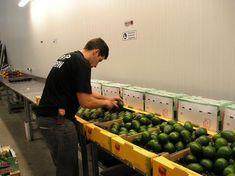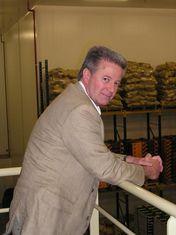

“The place of an importer is in his office,” said Comexa boss Claude Pobelle with a smile. “I am not a big traveller. My place is among my team here in Rungis, rather than out in the centre of production.
“New regulations on traceability and health and safety in France require time. But when you work with partners whose professionalism and spirit you can trust, travelling extensively is not essential.”
This type of talk is not often heard in the importing part of this industry. However it is indicative of an attitude that has made Comexa a major player in the very competitive French avocado market as well as exotic fruits.
Founded in 1986, Comexa has recently settled into new premises in the Rungis market extension, Eurodelta. The company has a 2,600 square metre warehouse composed of five cold rooms, three levels of storage capacity and eight consolidation and loading bays. Also included in the premises is a ripening room, a quality lab and a repacking area, adhering to all HACCP requirements.
Since its inception, Comexa has nurtured intelligent and strong partnerships, especially with South African suppliers, said Pobelle: “I appreciated the Anglo-Saxon way of doing business over there,” he said. “The company teamed with Tabanelli Export, a major exporter in the Tzaneen area, with around one million boxes structured around two brands Superfruit and San Marco (organic avocados).
Together they built a packing facility - Tzaneen Fruit Packers (TZP) - in 1989 to emphasise their partnership approach. “After opening TZP, we found it necessary to safeguard our sourcing and sought deals with others exporters in the area,” explained Pobelle.
Comexa also works with Summerfield, Premier and Intertrading. In 2002, the company bought its original partner, with Hans Merensky providing Comexa with a year-round linear Superfruit supply and a 1.5 million box potential each season.
During the French summer, Comexa has also succeeded in developing its sourcing network: Peruvian and Kenyan avocados appeared through the brands Sunshine and Safari-Indufarm, also Comexa’s partners for Peruvian mangoes and Kenyan beans.
“This is the Comexa spirit,” explained Pobelle. “We try to go beyond basic commercial deals to establish long term, deep, and meaningful partnerships. The job has evolved a lot in the last two decades. I am convinced it is all a question of personalities in the first place and not necessarily of structure.
We have the same potential problems as our colleagues and competitors but the contacts we have established with our partners often make things easier - both externally and within our own ranks.”
Proof of that particular pudding perhaps is that Comexa has a reputation for very low staff turnover.



